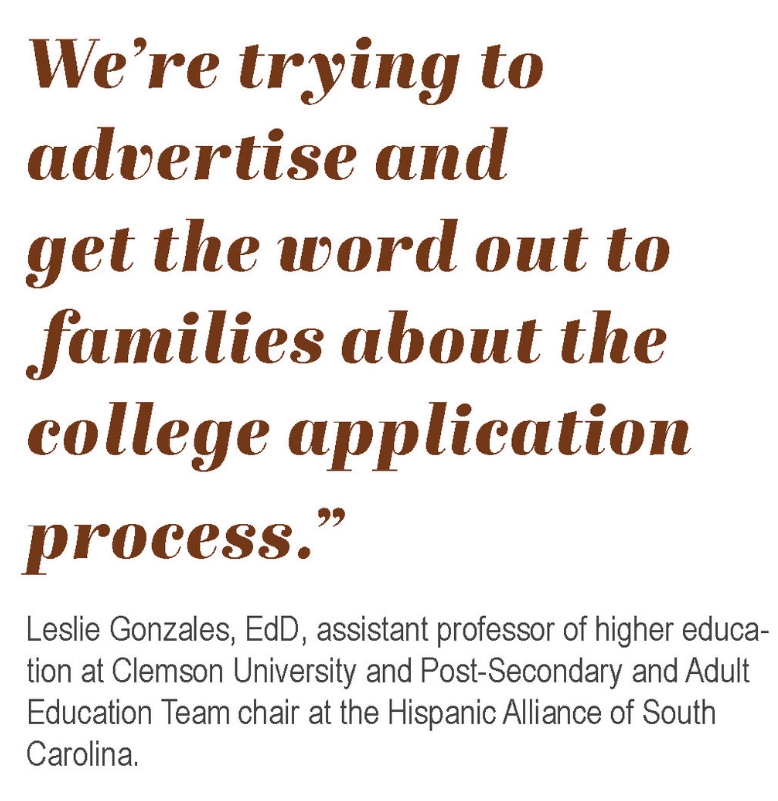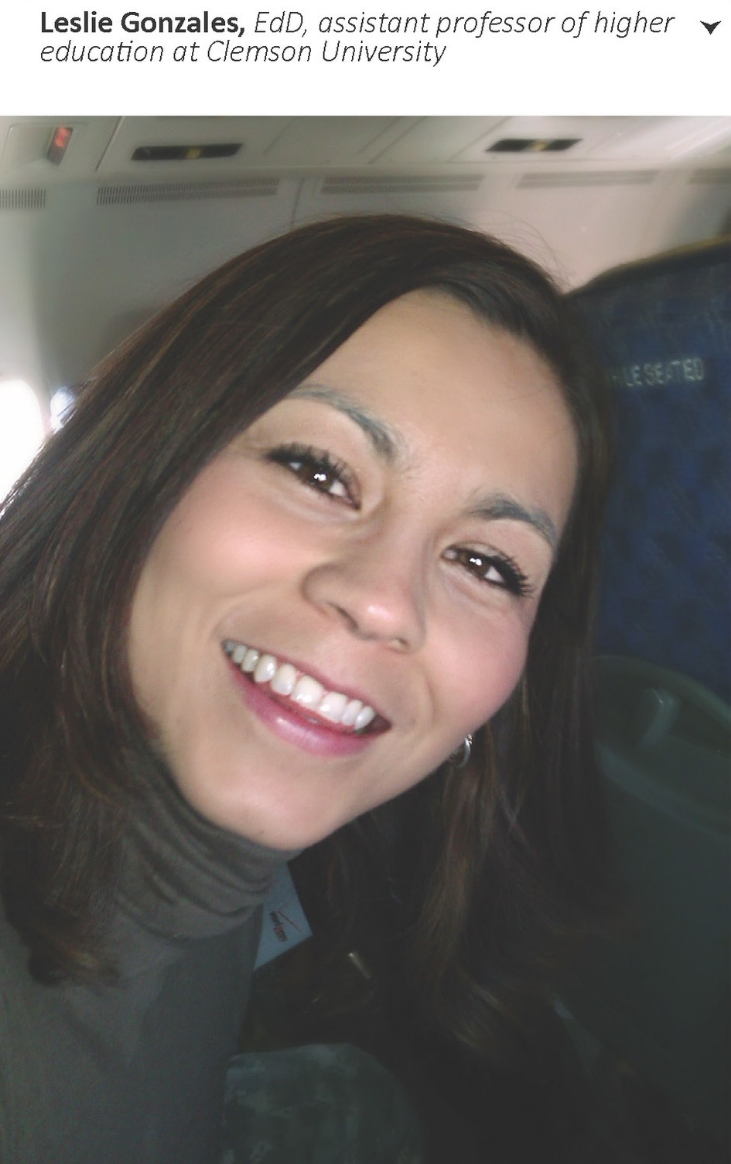San Antonio, Chicago, and Los Angeles all come to mind when one thinks of large Hispanic populations. Greenville, South Carolina - not so much. But as it turns out, Greenville has a significant Hispanic population that has grown considerably since the last census.
San Antonio, Chicago, and Los Angeles all come to mind when one thinks of large Hispanic populations. Greenville, South Carolina - not so much. But as it turns out, Greenville has a significant Hispanic population that has grown considerably since the last census.
So Greenville was the perfect city to launch a team seeking to identify gaps in services to Hispanics in South Carolina’s upstate region. It’s called the Post-Secondary and Adult Education Team and it is a component of the Hispanic Alliance of South Carolina, a nonprofit that seeks to enrich the quality of life for Hispanics in and around Greenville.
The Post-Secondary and Adult Education Team has been working with high school and middle school students in and around Greenville as well as those near Clemson University, about a 45-minute drive from Greenville. The team wants to improve access to higher education for Hispanics by partnering with existing educational institutions, programs and services; gauging the educational needs of the community and identifying areas of disparity through open community forums; and developing and implementing educational programs to fill educational voids in the Hispanic community. “We’re trying to advertise and get the word out to families about the college application process,” says Leslie Gonzales, EdD, assistant professor of higher education at Clemson University and Post-Secondary and Adult Education Team chair at the Hispanic Alliance of South Carolina.

Gonzales and her team work with high schools and postsecondary institutions to determine what these institutions are doing to create both access to college and a welcoming environment for Hispanic students and their families. The team members reach out to high school counselors, parent liaisons, principals and school districts to form relationships. Through these relationships they identify students and their families who need assistance navigating the college application process and they help them out.
The team works primarily with individuals in the Greenville School District, serving nearly 68,000 students, of which about 11 percent are Hispanic. The volunteers who comprise the team, however, don’t stop at the Greenville border. Because many of them enjoy connections across the state, the alliance also serves high schools in Clemson, Fikins and Aiken.
Gonzales established the Post-Secondary and Adult Education Team about a year and a half ago. After having several conversations and team meetings she identified a disconnect between Latinos in Greenville’s community, the organizations that serve the families and the institutions of higher education. These are very complex issues, says Gonzales. “We felt what we really needed to focus on was getting institutions to talk to us…to get us on their radar.”
The team developed a strategic plan to foster a rapport with the institutions within a year. The framework of the plan established four phases. The first was a simple introduction at each institution. Gonzales got the names and phone numbers of individuals with whom they would like to start a dialog. In the second phase, she set up meetings. “We wanted to discuss who we are at the Hispanic Alliance, what we do and what our connection is within the Latino community. We wanted to highlight some data points that show how large the Latino population is in Greenville,” says Gonzales. At these meetings she and her team presented data about which Latinos were going to college and the colleges they were selecting. “We just wanted to open that conversation,” she said.
To show the target institutions that the Hispanic Alliance was not just interested in criticizing those institutions but was determined to be a resource and willing to be a partner, the team presented a set of initiatives to the institutions in the third phase of the strategic plan.
Gonzales was eager to demonstrate sustainability. In the fourth phase she and her team made it abundantly clear to the institutions that the assistance her team was offering was not going to be a one-shot deal. This is an ongoing conversation and effort, she told them.
The team’s first major accomplishment took place during Hispanic Heritage Month last year. The Hispanic Alliance teamed up with the Latino Task Force at Clemson and Hispanic advocates at Wofford College, Furman College and Greenville Technical College. Gonzales and her colleagues wrote a grant and were awarded $5000 to implement it. They used the money to educate the communities around these schools about the plight of Latinos. “We presented a trilogy film and discussion sequence. We brought in films and the filmmakers,” says Gonzales. The alliance showed three films at three different campuses, each followed by a discussion about the film.
On the Clemson campus the alliance presented the film Stolen Education by Enrique Alemán Jr. and Rudy Luna. Taking place in Texas, this film features a 1956 court case in which Mexican families fight for equality. The filmmakers demonstrate how practices in the 1950s marginalized Spanish-speaking individuals in Texas.

At Greenville Technical College, the alliance showed Who is Dayani Cristal? by Marc Silver and Mark Monroe. In this film an anonymous body in the Arizona desert sparks the beginning of a real-life human drama. The search for the body’s identity leads the viewer across a continent to seek out those left behind. “It really humanizes the immigrant experience and captures what happens when an immigrant comes from any Latin American country and dies in the process,” says Gonzales. The film asks poignant questions like: when an immigrant dies, what does the family go through and what does the government do on its end?
The third film in the trilogy was made by several leaders of the faith-based community and highlights undocumented immigrants from around the globe. Shown at Wofford College this film followed these immigrants as they picked crops in the fields and worked in canning factories. “Doing the work that many others might not,” says Gonzales.
After each film quest speakers addressed the audience. “Enrique Alemán gave a very intimate conversation with school teachers and counselors from the Greenville and Clemson areas…He was able to talk through the film and talk about the families he interviewed…South Carolina is repeating the terrible mistakes that were done in Texas in terms of language policies, for example. So they got to see how these played out in people’s lives in different ways,” says Gonzales.
Those who attended the three showings left with a new perspective on these issues, says Gonzales. “It was a much more humane one. They no longer viewed these issues through a detached and economic lens. It was about people, people’s lives, people’s families. I think that is really important,” she said.
To create long-term institutional change The Hispanic Alliance and the Post-Secondary Education Team held its first-ever college fair at Greenville Tech back in March. “We’re trying to think at a system level,” says Gonzales.
About 200 individuals attended the event workshops and stopped by tables hosted by 12 colleges and universities. Eight community organizations delivered presentations. The college and university reps who were on hand reported very positive exchanges with the attendees.
“The Hispanic Alliance Higher Education Team, all composed of volunteers, did a fantastic job of providing informative education, on-site interpretation, help with logistics, coffee and pan dulce and child care,” says Gonzales.
There are plans in the works to follow up this year’s college fair with an essay and resume workshop for high school students this coming June. “We also plan to do a professional development workshop for all of the Hispanic Alliance’s Higher Education Team…about 50 members, so that we are up to date on all important information related to DACA and also related to federal financial aid policy. That will probably take place this summer,” says Gonzales.